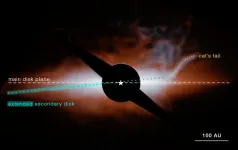(Press-News.org) Researchers from The University of Queensland have launched the world’s biggest drug survey, to gain insight into drug use around the globe.
The Global Drug Survey was founded by Professor Adam Winstock from University College London and has been running annually since 2012.
This year the survey is led by Dr Cheneal Puljevic from UQ’s School of Public Health.
“The aim of the Global Drug Survey is to make drug use safer for people, regardless of the drug’s legality,” Dr Puljevic said.
“We hope to gain insight into drug use across the world, so we can inform individuals and organisations about what’s going on in their communities and how best to reduce harms from drug use.”
This year respondents will be asked about drug prices, decriminalisation, tobacco endgame policies, performance and image enhancing drugs, nitrous oxide use and drug use in nightlife and festival settings.
It will also be the first Global Drug Survey to ask questions about the use of illicit tobacco.
Dr Puljevic said there had been very little international research into the tobacco black market.
“Illegal tobacco use has exploded in the past year, with some tobacconists in Australia selling packets of cigarettes for as little as $5,” she said.
“But we don’t really know much about who’s using illicit tobacco or where they're getting it from.”
The 2024 survey also includes questions about how peoples’ drug use would change if drugs like MDMA and cocaine were decriminalised.
The anonymous online survey has been translated into 9 different languages and will be circulated worldwide.
It takes between 20 to 30 minutes to complete.
“The Global Drug Survey usually gets more than 100,000 respondents from more than 25 countries, so our goal is to exceed that this year,” Dr Puljevic said.
“We want as many diverse perspectives as possible, with respondents of all ages, genders and sexual orientations and from rural and urban areas.”
The Global Drug Survey 2024 will run until 30 April and can be completed here.
Media: UQ Faculty of Medicine, med.media@uq.edu.au, +61 436 368 746.
END
UQ leads the world’s largest drug survey
Researchers from The University of Queensland have launched the world’s biggest drug survey, to gain insight into drug use around the globe.
2024-01-11
ELSE PRESS RELEASES FROM THIS DATE:
Panel members for new psychiatric ‘bible’ received over $14M from industry
2024-01-11
Sixty percent of US physicians serving as panel and task force members for the American Psychiatric Association’s official manual of psychiatric disorders received payments from industry totalling $14.24m, finds a study published by The BMJ.
Because of the enormous influence of diagnostic and treatment guidelines, the researchers say their findings “raise questions about the editorial independence of this diagnostic manual.”
Often referred to as the ‘bible’ of psychiatric disorders, the Diagnostic and Statistical Manual of Mental Disorders, fifth edition, text revision (DSM-5-TR) ...
Perinatal depression linked to increased risk of death
2024-01-11
Women who suffer depression during or after pregnancy have a higher risk of death by both natural and unnatural causes, a new study of childbirth in Sweden published in The BMJ reports. The increased risk peaks in the month after diagnosis but remains elevated for as long as 18 years afterwards.
Women who develop perinatal depression, which is to say depression during pregnancy or shortly after childbirth, are generally twice as likely to die of natural or, as in most cases, unnatural causes. They are six times more likely to commit than women without this form of depression. The increase ...
Landmark national study supports use of whole genome sequencing in standard cancer care
2024-01-11
Study shows that combining whole genome sequence and clinical data together at scale supports the delivery of precision cancer care, where cancer diagnosis and treatment is tailored to the individual patient
Results support increased use of genomic testing in cancer care via the NHS Genomic Medicine Service
The research shows the value of data from the ground-breaking 100,000 Genomes Project to improve understanding of cancer and help researchers to develop new treatments.
In the largest study of its kind, scientists today report how combining health data with whole genome sequence (WGS) data in patients with cancer can help doctors provide more tailored care for ...
Is there a common link between the physical and social worlds? Two brothers think so.
2024-01-11
A Rutgers biophysical chemist and his brother, a political scientist on the West Coast, have joined intellectual forces, realizing a long-standing dream of co-authoring an article that bridges their disciplines involving cells and society.
In their paper, they have proposed that powerful parallels exist between the microscopic, natural world of cells and molecules and the human-forged realm of organizations and political systems.
Taking it a step further, the brothers – eminent scholars who have served as top leaders of their respective institutions – have proposed that humankind can draw lessons from what the microscopic and macroscopic worlds have in common. Ideally, ...
Artificial intelligence helps unlock advances in wireless communications
2024-01-11
A new wave of communication technology is quickly approaching and researchers at UBC Okanagan are investigating ways to configure next-generation mobile networks.
Dr. Anas Chaaban works in the UBCO Communication Theory Lab where researchers are busy analyzing a theoretical wireless communication architecture that will be optimized to handle increasing data loads while sending and receiving data faster.
Next-generation mobile networks are expected to outperform 5G on many fronts such as reliability, coverage and intelligence, explains Dr. Chaaban, an Assistant Professor ...
Personalizing lifestyle interventions for cancer survivors
2024-01-11
MIAMI, FLORIDA (Jan. 10, 2024) – Researchers with Sylvester Comprehensive Cancer Center at the University of Miami Miller School of Medicine have received funding to better understand how personalized nutrition and exercise programs can improve quality of life after cancer treatment.
The three-year, approximately $700,000 grant from the Applebaum Foundation with added support by Sylvester, will fund the On Precision Oncology Interventions in Nutrition and Training (OnPOINT) clinical study to develop individualized diet and activity programs ...
Louisiana Cancer Research Center accepting applications for summer undergraduate research program - SUCRE
2024-01-10
January 10, 2024, New Orleans, LA - College students interested in pursuing a career in cancer research are urged to apply to The Louisiana Cancer Research Center’s 8-week Summer Undergraduate Cancer Research Experience, SUCRE.
Selected students can explore and develop their interests by working in a research lab with an assigned faculty mentor from member institutions Louisiana State University Health Sciences Center - New Orleans, Tulane School of Medicine and Xavier University of Louisiana.
The program runs from Thursday, June 3 through Friday, July 26, 2024. ...
NASA’s Webb discovers dusty ‘cat’s tail’ in Beta Pictoris System
2024-01-10
Beta Pictoris, a young planetary system located just 63 light-years away, continues to intrigue scientists even after decades of in-depth study. It possesses the first dust disk imaged around another star — a disk of debris produced by collisions between asteroids, comets, and planetesimals. Observations from NASA’s Hubble Space Telescope revealed a second debris disk in this system, inclined with respect to the outer disk, which was seen first. Now, a team of astronomers using NASA’s James Webb Space Telescope to image the Beta Pictoris system (Beta Pic) has discovered a new, previously unseen structure.
The ...
Texas A&M AgriLife Research gets $5.2 million grant for onion improvement
2024-01-10
Texas A&M AgriLife Research received more than $5.2 million in grant funding from the U.S. Department of Agriculture’s National Institute of Food and Agriculture for a project to address multiple aspects of the southern U.S. onion harvest system.
Subas Malla, Ph.D., Texas A&M AgriLife Research associate professor at the Texas A&M AgriLife Research and Extension Center in Uvalde, will serve as director for a short-day onion project. (Texas A&M AgriLife photo by Paul Schattenberg)
The director for the “Ensuring Future Economic Viability of U.S. Short-Day ...
Preeclampsia and preterm birth risk may be reduced by calcium dose lower than current WHO standard
2024-01-10
Key points:
According to two trials of 11,000 pregnant women in India and in Tanzania, low-dose calcium supplementation (500 milligrams per day) appears as effective at reducing the risk of preeclampsia and preterm birth as high-dose calcium supplementation (1,500 milligrams per day).
The World Health Organization currently recommends high-dose calcium supplementation—equivalent to three calcium pills a day—for pregnant women in contexts with low-calcium diets, predominantly low- and middle-income countries. Lowering the pill burden to one 500mg ...
LAST 30 PRESS RELEASES:
Striking genomic architecture discovered in embryonic reproductive cells before they start developing into sperm and eggs
Screening improves early detection of colorectal cancer
New data on spontaneous coronary artery dissection (SCAD) – a common cause of heart attacks in younger women
How root growth is stimulated by nitrate: Researchers decipher signalling chain
Scientists reveal our best- and worst-case scenarios for a warming Antarctica
Cleaner fish show intelligence typical of mammals
AABNet and partners launch landmark guide on the conservation of African livestock genetic resources and sustainable breeding strategies
Produce hydrogen and oxygen simultaneously from a single atom! Achieve carbon neutrality with an 'All-in-one' single-atom water electrolysis catalyst
Sleep loss linked to higher atrial fibrillation risk in working-age adults
Visible light-driven deracemization of α-aryl ketones synergistically catalyzed by thiophenols and chiral phosphoric acid
Most AI bots lack basic safety disclosures, study finds
How competitive gaming on discord fosters social connections
CU Anschutz School of Medicine receives best ranking in NIH funding in 20 years
Mayo Clinic opens patient information office in Cayman Islands
Phonon lasers unlock ultrabroadband acoustic frequency combs
Babies with an increased likelihood of autism may struggle to settle into deep, restorative sleep, according to a new study from the University of East Anglia.
National Reactor Innovation Center opens Molten Salt Thermophysical Examination Capability at INL
International Progressive MS Alliance awards €6.9 million to three studies researching therapies to address common symptoms of progressive MS
Can your soil’s color predict its health?
Biochar nanomaterials could transform medicine, energy, and climate solutions
Turning waste into power: scientists convert discarded phone batteries and industrial lignin into high-performance sodium battery materials
PhD student maps mysterious upper atmosphere of Uranus for the first time
Idaho National Laboratory to accelerate nuclear energy deployment with NVIDIA AI through the Genesis Mission
Blood test could help guide treatment decisions in germ cell tumors
New ‘scimitar-crested’ Spinosaurus species discovered in the central Sahara
“Cyborg” pancreatic organoids can monitor the maturation of islet cells
Technique to extract concepts from AI models can help steer and monitor model outputs
Study clarifies the cancer genome in domestic cats
Crested Spinosaurus fossil was aquatic, but lived 1,000 kilometers from the Tethys Sea
MULTI-evolve: Rapid evolution of complex multi-mutant proteins
[Press-News.org] UQ leads the world’s largest drug surveyResearchers from The University of Queensland have launched the world’s biggest drug survey, to gain insight into drug use around the globe.




